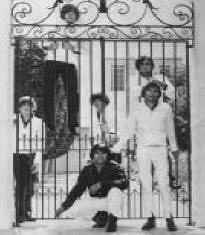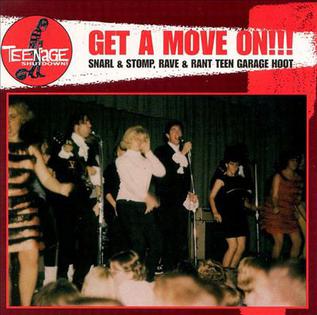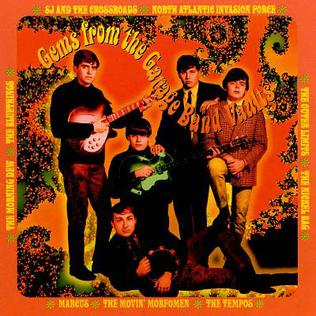
Nuggets: Original Artyfacts from the First Psychedelic Era is a compilation album of American psychedelic and garage rock singles that were released during the mid-to-late 1960s. It was created by Lenny Kaye, who was a writer and clerk at the Village Oldies record shop in New York. He would later become the lead guitarist for the Patti Smith Group. Kaye produced Nuggets under the supervision of Elektra Records founder Jac Holzman. Kaye conceived the project as a series of roughly eight LP installments focusing on different US regions, but Elektra convinced him that one double album would be more commercially viable. It was released on LP by Elektra in 1972 with liner notes by Kaye that contained one of the first uses of the term "punk rock". It was reissued with a new cover design by Sire Records in 1976. In the 1980s, Rhino Records issued Nuggets in a series of fifteen installments, and in 1998 as a 4-cd box set.

Pebbles is a compilation of US underground and garage single record releases from the mid- to late-1960s. It had a limited original release in 1978 and a more general release in 1979. It was followed by several subsequent Pebbles compilations and albums. This album is nowadays known as Pebbles, Volume 1 and was originally issued in 1978 as Pebbles, Volume One: Artyfacts from the First Punk Era, an obvious riff on Nuggets: Original Artyfacts from the First Psychedelic Era, a similar, groundbreaking compilation from 1972.

The Pebbles Box is a 5-LP box set of mid-1960s garage rock and psychedelic rock recordings, primarily by American bands. Several years later, a similar 5-CD box set was released that was called the Trash Box. The Pebbles Box purports to collect the first five volumes of the Pebbles series, although there are fewer songs than on the original LPs: 72 total tracks on the five discs, as compared with 86 on the original LPs. Also, as is generally true of the CD reissues of these five volumes, the tracks differ significantly on all five discs as compared to both the original Pebbles LPs and the later Pebbles CDs in the corresponding volumes; and the surf rock rarities on Pebbles, Volume 4 have been eschewed entirely.

Trash Box is a 5-CD box set of mid-1960s garage rock and psychedelic rock recordings, primarily by American bands. This box set is similar to the earlier Pebbles Box and includes almost all of the same recordings in that box set, along with numerous bonus tracks at the end of each disc. Supposedly, the Trash Box collects the first five volumes of the CDs in the Pebbles series. However, as is generally true of the CD reissues of these five volumes, the tracks differ significantly on all five discs as compared to both the original Pebbles LPs and the later Pebbles CDs in the corresponding volumes; and the surf rock rarities on Pebbles, Volume 4 have been eschewed entirely. Overall, there are 109 tracks in the box set as compared to 101 songs on the individual CDs and 72 tracks in the Pebbles Box.

Essential Pebbles, Volume 2 is a compilation album in the Essential Pebbles series. Although subtitled Still More Ultimate '66 garage classics!, not all of the recordings on the album were originally released in 1966.

The Human Expression was an American garage and psychedelic rock band from Los Angeles that released three well-regarded singles, and made additional demo recordings between 1966 and 1967.
Highs in the Mid-Sixties were a series of compilation albums released in the mid 1980s on AIP Records developed by Greg Shaw. The series was spun off of the similar Pebbles series. Each volume focuses on a specific geographical region.

Highs in the Mid-Sixties, Volume 7 is a compilation album in the Highs in the Mid-Sixties series, featuring recordings that were released in Washington and Oregon. Highs in the Mid-Sixties, Volume 14 and Highs in the Mid-Sixties, Volume 16 are later volumes in the series that feature bands from these states.

Garage Beat '66 Volume 5: Readin' Your Will,"is the fifth installment in the Garage Beat 66 series of garage rock compilations issued by Sundazed Records, which is available exclusively on compact disc. This volume was released on June 21, 2005 and consists of a mixture of raw up-tempo numbers as well as some psychedelic. Like all of the entries in the series, which is noted for good sound quality, all of the tracks are mastered from the original studio master sources and contain well-researched liner notes written by knowledgeable authorities. Volume 5 is mentioned by AllMusic as perhaps the best collection in the series.

Teenage Shutdown! Get a Move On!!! is a compilation album featuring garage and folk rock musical artists that recorded in the 1960s. It is the seventh installment of the Teenage Shutdown! series and was released on Crypt Records on December 29, 1998.
Green Crystal Ties is an extensive series of compilation albums focusing on obscure and relatively unknown psychedelic and garage rock musical artists that recorded during the 1960s and early 1970s. Released on Collectables Records, Green Crystal Ties features ten total albums, all of which were issued in 1998. For the most part, the albums expand on past series distributed by Collectables Records and its contemporary Cicadelic Records, and as with Nuggets employ original master source elements when possible and arrange the various installments along contextual and conceptual lines. The music tends to be more refined in the earlier volumes of the series, progressively venturing out into more obscure and unknown material later much in the same fashion as the Pebbles or Back from the Grave series. The various installments are not ordered chronologically, but instead place emphasis on certain regions or musical styles. Although most of the music was recorded by American groups, there are a few exceptions such the heavy metal band Black Sabbath and King Richard and the Knights. Green Crystal Ties pays homage to the band the Zakary Thaks and their song of the same name. All of the entries are housed highly colorful packaging designed by Nicole Ruhl Fichera and each features a photograph of one of the compiled bands on the front cover. The packaging for all entries includes well-researched liner notes written by Steve Kaplan and Matt Wendelken which provide helpful biographical information about the bands and their songs.

Green Crystal Ties, Volume 10: 60s Garage Band Flashback is a compilation album featuring psychedelic and garage rock musical artists that recorded in the 1960s and early 1970s. It is the tenth and final installment of the Green Crystal Ties series and was released on Collectables Records on April 7, 1998. The album arguably features the most obscure musical artists featured in the series.

Green Crystal Ties, Volume 9: The Great Lost Psychedelic Garage Bands is a compilation album featuring obscure American psychedelic rock musical artists that recorded in the 1960s. It is the ninth installment of the Green Crystal Ties series and was released on Collectables Records on April 7, 1998. The album is considered one of the series best showings of psychedelic music.

Green Crystal Ties, Volume 6: Rarities from the Psychedelic Vaults is a compilation album featuring obscure psychedelic rock bands that recorded in the 1960s. It is the sixth installment of the Green Crystal Ties series and was released on Collectables Records on April 7, 1998. Though Volume 6 focuses specifically on psychedelia, the album is commended for featuring a wide-diversity of musical styles intertwined in the genre.

Green Crystal Ties, Volume 2: The Best of the 60s Garage Band Scene is the second installment in the Green Crystal Ties series of psychedelic and garage rock compilations issued by Collectables Records. It was released on April 7, 1998 and features songs by obscure American musical artists who recorded in the 1960s and early 1970s. Like all of the entries in the series, the highly colorful packaging is designed by Nicole Ruhl Fichera and features a picture of the Basement Wall from Baton Rouge, Louisiana on front. The inner sleeve includes well-researched liner notes written by Steve Kaplan and Matt Wendelken which provide helpful biographical information about the bands and their songs.

The Lewallen Brothers were an American garage rock band formed in Tucson, Arizona in 1962. Combining an element of folk rock, similar to the sound of the Beau Brummels, with the essence of a raw garage band, the group became immensely popular in Arizona. Though the Lewallen Brothers never broke through to a national audience, the band is noted for being one of the longest-enduring garage musical acts to emerge from the 1960s, as the group performed well into the 1990s.

Green Crystal Ties, Volume 3: Gloria Meets 96 Tears is the third installment in the Green Crystal Ties series of psychedelic and garage rock compilations issued by Collectables Records. It was released on April 7, 1998 and features songs by obscure American musical artists who recorded in the 1960s. Like all of the entries in the series, the highly colorful packaging is designed by Nicole Ruhl Fichera and on this occasion features a front cover photograph of Yesterday's Children, who are included in this set. The inner sleeve includes well-researched liner notes written by Steve Kaplan and Matt Wendelken which provide helpful biographical information about the bands and their songs.

Green Crystal Ties, Volume 4: Mind-Expanding 60s Psychedelia is the fourth installment in the Green Crystal Ties series of psychedelic and garage rock compilations issued by Collectables Records. It was released on April 7, 1998 and like volume 1 features songs by Texas garage and psychedelic bands who recorded in the 1960s. The series is known for good quality mastering and sound quality. Like all of the entries in the series, the highly colorful packaging is designed by Nicole Ruhl Fichera. The inner sleeve includes well-researched liner notes written by Steve Kaplan and Matt Wendelken which provide helpful biographical information about the bands and their songs.

Green Crystal Ties, Volume 5: Gems from the Garage Band Vaults is the fifth installment in the Green Crystal Ties series of psychedelic and garage rock compilations issued by Collectables Records. It was released on April 7, 1998 and like volume 1 features songs by obscure bands who recorded in the 1960s. The series is known for good quality mastering and sound quality. Like all of the entries in the series, the highly colorful packaging is designed by Nicole Ruhl Fichera. The inner sleeve includes well-researched liner notes written by Steve Kaplan and Matt Wendelken which provide helpful biographical information about the bands and their songs.

Green Crystal Ties, Volume 8: Stomping Garage Band Legends is a compilation album featuring garage rock musical artists that recorded in the 1960s. It is the eighth installment of the Green Crystal Ties series and was released on Collectables Records April 7, 1998. The album, for what it lacks in complex lyricism, centers around frantic performances alluding to teenage alienation and angst toward society.

















